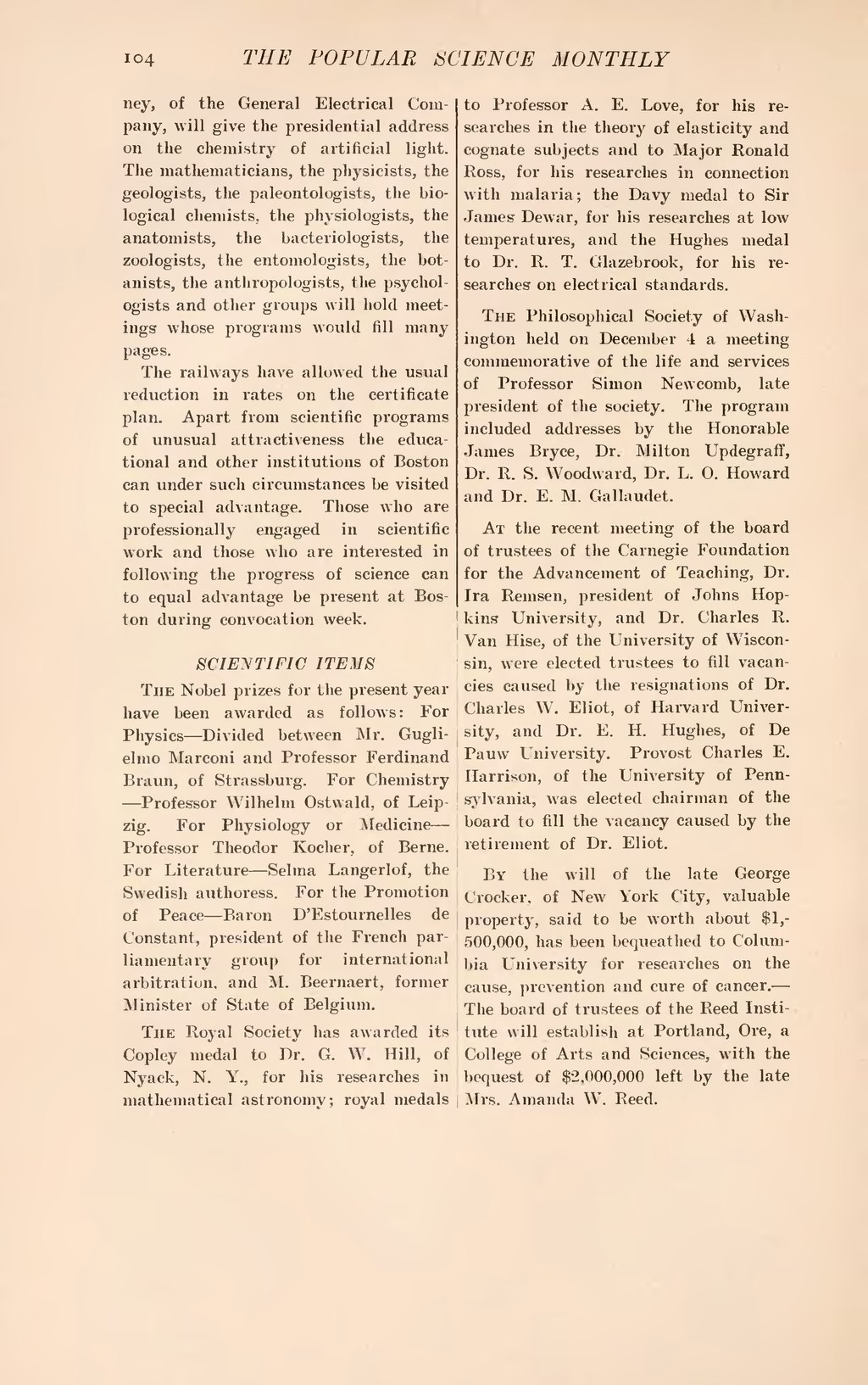ney, of the General Electrical Company, will give the presidential address on the chemistry of artificial light. The mathematicians, the physicists, the geologists, the paleontologists, the biological chemists, the physiologists, the anatomists, the bacteriologists, the zoologists, the entomologists, the botanists, the anthropologists, the psychologists and other groups will hold meetings whose programs would fill many pages.
The railways have allowed the usual reduction in rates on the certificate plan. Apart from scientific programs of unusual attractiveness the educational and other institutions of Boston can under such circumstances be visited to special advantage. Those who are professionally engaged in scientific work and those who are interested in following the progress of science can to equal advantage be present at Boston during convocation week.
SCIENTIFIC ITEMS
The Nobel prizes for the present year have been awarded as follows: For Physics—Divided between Mr. Guglielmo Marconi and Professor Ferdinand Braun, of Strassburg. For Chemistry—Professor Wilhelm Ostwald, of Leipzig. For Physiology or Medicine—Professor Theodor Kocher, of Berne. For Literature—Selma Langerlof, the Swedish authoress. For the Promotion of Peace—Baron D'Estournelles de Constant, president of the French parliamentary group for international arbitration, and M. Beernaert, former Minister of State of Belgium.
The Royal Society has awarded its Copley medal to Dr. G. W. Hill, of Nyack, N. Y., for his researches in mathematical astronomy; royal medals to Professor A. E. Love, for his researches in the theory of elasticity and cognate subjects and to Major Ronald Ross, for his researches in connection with malaria; the Davy medal to Sir James Dewar, for his researches at low temperatures, and the Hughes medal to Dr. R. T. Glazebrook, for his researches on electrical standards.
The Philosophical Society of Washington held on December 4 a meeting commemorative of the life and services of Professor Simon Newcomb, late president of the society. The program included addresses by the Honorable James Bryce, Dr. Milton Updegraff, Dr. R. S. Woodward, Dr. L. 0. Howard and Dr. E. M. Gallaudet.
At the recent meeting of the board of trustees of the Carnegie Foundation for the Advancement of Teaching, Dr. Ira Remsen, president of Johns Hopkins University, and Dr. Charles R. Van Hise, of the University of Wisconsin, were elected trustees to fill vacancies caused by the resignations of Dr. Charles W. Eliot, of Harvard University, and Dr. E. H. Hughes, of De Pauw University. Provost Charles E. Harrison, of the University of Pennsylvania, was elected chairman of the board to fill the vacancy caused by the retirement of Dr. Eliot.
By the will of the late George Crocker, of New York City, valuable property, said to be worth about $1,500,000, has been bequeathed to Columbia University for researches on the cause, prevention and cure of cancer.—The board of trustees of the Reed Institute will establish at Portland, Ore, a College of Arts and Sciences, with the bequest of $2,000,000 left by the late Mrs. Amanda W. Reed.

